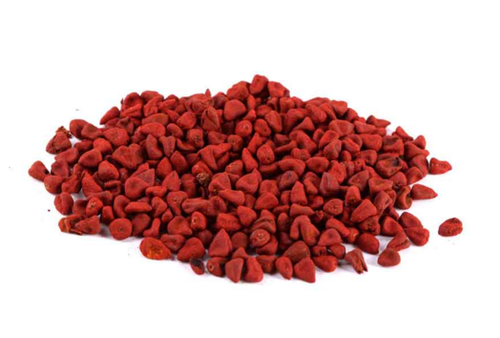Short answer
Annatto and its parent plant achiote are rich in vitamin A and other nutrients. Some people, however, are allergic to annatto and others have suggested it may aggravate IBS.
Overall beneficial to your health. Things rated a 'B' may have some harmful qualities to pay attention to.
View Full Grading System
Category 'A'
Very healthy and numerous health benefits. Side effects are rare. Things rated an 'A+' are typically necessary for survival (for example, water).
Very healthy and numerous health benefits. A few harmful qualities may be associated, but only under certain circumstances such as an allergic reaction.
Very healthy and numerous health benefits. Harmful qualities may be associated, but aren't usually serious.
It is important to note that even the best things in life can become bad in immoderate amounts. So, although something may be rated an 'A+', overconsumption/overdoing can bring unwanted effects.
Category 'B'
Very beneficial to your health. Things rated a 'B+' may have a few harmful qualities to pay attention to.
Overall beneficial to your health. Things rated a 'B' may have some harmful qualities to pay attention to.
More beneficial to your health than not. However, harmful qualities are most likely associated and shouldn't be overlooked.
The main difference between category 'A' and category 'B' is the harmful qualities typically present in 'B' items. Serious side effects are usually uncommon, but are still possible and should be taken note of.
Category 'C'
Both beneficial and harmful qualities associated. Things rated a 'C+' are typically a bit more on the beneficial side. Still, moderation is important.
A fairly even ratio of beneficial and harmful qualities. Moderation is important. Very general topics that can lean towards both sides of the spectrum will be placed here as well. Rice, for example, can be good or bad depending on the type.
More harmful than beneficial. Side effects are common, especially when consumed/done excessively. Moderation is very important.
Category 'C' usually denotes to both good and bad qualities. When it comes to this category, it is important to keep this word in mind: moderation.
Category 'D'
Harmful to your health. Although benefits may be associated, the bad most likely outweighs the good. Moderation is very important.
Harmful to your health. A few benefits may be associated, but the bad outweighs the good. Moderation is extremely important.
Harmful to your health. Very few, if any, benefits are present. Things in this category should be avoided as much as possible.
Category 'D' is typically for things that are more harmful than beneficial. While consuming/doing something unhealthy once in a blue moon shouldn't hurt, we definitely recommend eliminating 'D' items as a regular part of your routine/diet.
Category 'F'
Category 'F' is for things that fail to bring anything beneficial to the table, and are very harmful to your health. We recommend completely avoiding anything in this category. Long-term side effects of 'F' items are usually very serious.
Category 'N'
'N' stands for neutral. Things placed into this category are generally (a) neither good nor bad for you, or (b) lack the necessary evidence to reach any conclusions.
Long answer
Annatto is a natural dye and food coloring. It's red-orange and comes from the seeds of the South American achiote plant. There, the achiote is used not just as a dye but as anti-microbial and anti-fungal treatment - it's a naturopathic way to push back against the symptoms of influenza and malaria.
So far, oral toxicity studies in mice have shown that annatto is safe at the low levels that it's found in foods. It's regarded as safe by the FDA and the European Food Safety Authority.
Annatto gets its color from a healthy dose of carotenoids, or vitamin A. They play a number of important roles in the body. Various health claims have been made about carotenoids - meta-analyses of the research have found that there's good evidence they protect against lung, head, and neck cancers but do not do the same for Parkinson's, breast, or prostate cancer. Vitamin A is nonetheless an important nutrient to the health of your skin, eyes, and brain and an important part of a balanced diet.
Annatto is also a source of tocotrienols - chemicals that are similar in structure but distinct from vitamin A. They're good for you; evidence suggests they help with cholesterol, heart disease, diabetes and cancer prevention. Other evidence shows they may help to defend your nervous system.
Annatto does cause severe allergic reactions in some people. The FDA does not currently list it as a major allergen; some people, however, may break out in hives after consuming it. See an immunologist if you think that you have an allergy to annatto.
Some have also suggested a link between annatto and irritable bowel syndrome, or IBS. A potential link was described by a doctor's letter to the editor of the Journal of Gastroenterology and the editor's response. While annatto and IBS may be connected, no studies so far have described such a link. If you have IBS, however, you may want to consider eliminating annatto from your diet to see if it alleviates your symptoms.
Possible short-term side effects
- allergic reaction
aggravate ibs
Commonly found in
- yellow cheeses
-
some white cheeses
-
crackers
-
cereals
-
salad dressings
-
light-colored ice cream
-
yogurt
-
coffeemate
-
mustard
-
medications
-
rice noodles
-
crystal light
Benefits
- rich source of vitamin a
-
good source of tocotrienols
Please turn your Ad Blocker off to see this content. Thank you!


 Approved by
Approved by 














